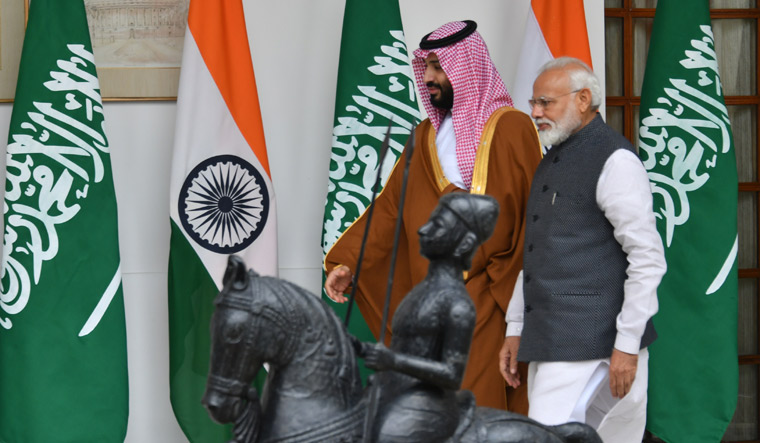The warmth of the embrace continues. Prime Minister Narendra Modi will travel to Saudi Arabia for a “short and intensive’’ visit next week. This will be Modi’s second visit to the country in three and a half years. It also comes on the heels of a visit by Saudi Crown Prince Mohammad Bin Salman to India in February.
The visit comes against the background of Modi’s continued engagement with Gulf countries to forge a new closeness. In August, Modi travelled to the UAE and to Bahrain. The newfound India-Saudi closeness is one of the biggest success stories of Modi West Asia outreach. This is especially important post the removal of article 370, as the most visible aspect of the Saudi softening is their rather careful statement on Kashmir.
“Let me assure you, Saudi Arabia has shown understanding on Jammu and Kashmir. I am sure that stand will have a salutary effect on Pakistan,’’ said T.S Tirumurti, secretary Economic Relations, Ministry of External Affairs at a media briefing on Thursday. The NSA, Ajit Doval, visited Riyadh earlier this month, just before the crucial FAFT meeting, which evaluated Pakistan’s compliance to weeding out terrorism.
On October 2, ANI reported that Saudi Arabia had told India that it understands “India’s approach and actions” in Jammu and Kashmir.
Saudi Arabia’s decision to issue a rather bland statement on Kashmir proved a victory for the Modi brand of diplomacy. In the statement, the Kingdom expressed “concern” over the development, but affirmed that the resolution of the conflict is “through peaceful settlement in accordance with the relevant international resolutions.” In addition, the statement “calls on the parties concerned to maintain peace and stability in the region and to take into account the interests of the people of the region.”
The T-word is also an area of understanding, with India and Saudi Arabia reportedly on the same page when it came to terrorism. “There were clear cut references in the joint statement,’’ said Tirumurti, referring to the agreement signed by the Crown Prince and the Prime Minister earlier this year. “Both countries are equally concerned about terrorism.’’ Saudi Arabia had condemned both the Pulwama and Uri attacks, he added. India, for its part, had condemned the drone and missile attacks on the oil facilities of Saudi Aramco, the country’s national petroleum company.
Beyond Kashmir, Saudi Arabia has also chosen to demonstrate that it values India with its wallet: Recently promising to invest $100 billion in India. The Prime Minister will also be wooing Saudi business, and will attend the third edition of the Future Investment Initiative.
Saudi Arabia has agreed to release 450 Indian prisoners, and also, to increase the annual quota for Hajj travellers, Modi’s request to bring it up to two lakh pilgrims. “There is cooperation in the area of tourism,’’ said Tirumurti.
It helps that, in addition, Saudi Arabia has opened its doors for tourism, with Saudi nationals now eligible for an e-visa to India.
In an attempt to boost ties that go deeper than strategy, India also trains Saudi defence personnel at the National Defence Academy, the National Defence College as well as at the Staff College in Wellington. “We already have a defence cooperation agreement,” said Tirumurti, adding that “the first joint naval exercise will take place either end of this year or beginning next year.”
Also on the cards for the visit is a possible agreement for Saudi Arabia—an oil rich country—to participate in India’s strategic petroleum reserves.



